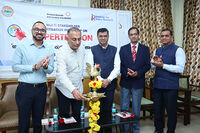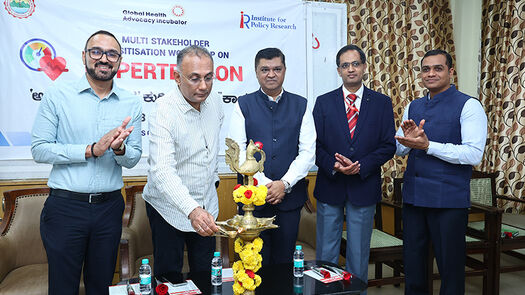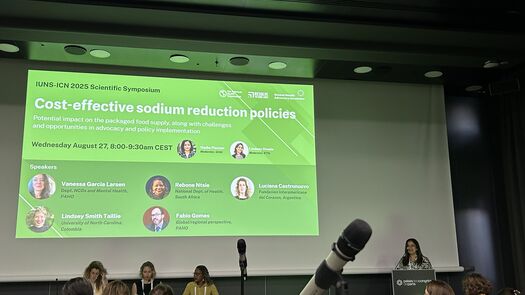November 25, 2025
November 19, 2025
India’s Karnataka State Takes a Bold Step Toward Early Hypertension Detection

The global trend for addressing hypertension in young people has been on the rise due to compounding factors such as obesity, lifestyle choices and geographic locations.
In a major move toward tackling this growing public health concern in the state of Karnataka, India, the Global Health Advocacy Incubator (GHAI) in partnership with All India Institute of Medical Sciences (AIIMS) Rishikesh and the Institute for Policy Research (IPR), recently convened a multi-stakeholder workshop in Bangalore, India.
The workshop brought together public health decision-makers, health professionals, researchers and media representatives to build consensus on strengthening hypertension screening and management across Karnataka. The event was inaugurated by Sri Dinesh Gundu Rao, Honorable Minister for Health, Government of Karnataka and Dr. Riaz Basha, Registrar, Rajiv Gandhi University of Health Sciences (RGUHS).
Demonstrating strong ownership by the Department of Health, Minister Rao announced the government’s intent to integrate lessons on hypertension and cardiovascular health into school textbooks — an important step toward building health literacy among young people. He also emphasized the crucial role of medical universities and the rest of academia in advancing early detection and prevention of hypertension and assured RGUHS’s continued support in training, curriculum inclusion and collaborations with public health partners to strengthen health system capacity.
Dr. U.S. Vishal Rao, a surgical oncologist who specialized in the head and neck at the Healthcare Global Cancer Care Center in Bengaluru, India, highlighted Karnataka’s leadership in public health and advocacy for lifestyle changes such as reducing salt intake and avoiding reuse of refined oil to lower hypertension risk. Dr. Pradeep Agarwal from AIIMS Rishikesh shared data on hypertension prevalence among adults aged 18 and older in Karnataka, drawing on global best practices for control and management. The GHAI team presented evidence on the state’s rising hypertension rates compared to the national average, which recommended that screening begin from age 18.
As a result of these engagements, all stakeholders made a commitment at the workshop to lower the age of hypertension screening from 30 to 18 years — a landmark policy shift that recognizes the growing burden of high blood pressure among India’s young adults.
Recognizing the media’s role in shaping public and policy understanding of noncommunicable diseases, the event included a focused media sensitization session on hypertension. Over 25 journalists from leading national and Karnataka-based outlets participated, gaining deeper insights into the public health and economic implications of the disease. In the weeks preceding and following the workshop, GHAI and partners held several rounds of direct engagement with senior editors and resident correspondents, facilitating a multi-modal journalism training series to build sustained attention on hypertension as a policy priority in the state.
To equip media professionals with credible, easy-to-use information, a press release and a comprehensive media folder were disseminated, along with expert interviews on the sidelines of the event. The engagements generated extensive and nuanced media coverage across print, television and digital platforms, signalling a growing recognition of hypertension as a silent but urgent health challenge.
The Karnataka initiative demonstrates GHAI’s commitment to supporting governments and civil society in advancing equitable, evidence-based responses to noncommunicable diseases. By fostering dialogue among policymakers, experts and the media, such partnerships are helping to turn awareness into action — shaping a healthier future for India’s next generation.
Related News
View All NewsNovember 19, 2025
India’s Karnataka State Takes a Bold Step Toward Early Hypertension Detection
September 30, 2025



